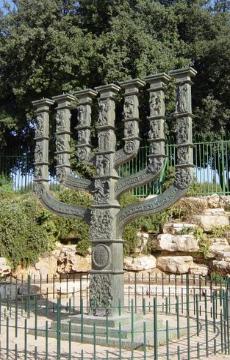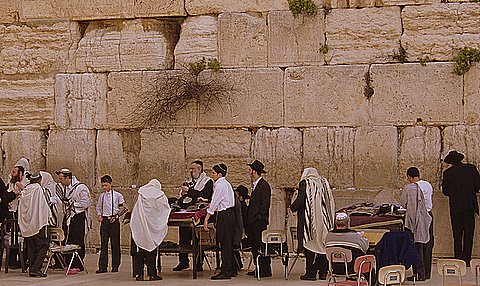-2-
Are The Jews Really Special?
For ages, the Jews have been called “the chosen people.” How did they get such a title? Did they make it up themselves? The Bible has much to say about this. In Deuteronomy 7:6, we read this about the Jews:
For you are a people holy to the LORD your God. The LORD your God has chosen you out of all the peoples on the face of the earth to be his people, his treasured possession.
So it was God who chose the Jewish people. We might ask the question, “Why the Jews?” They are certainly not a plentiful people on earth, since they number somewhat over 13 million today, or less than one half of one percent of world population. Nor were they the largest or greatest people of antiquity. When we look at the Bible in Deuteronomy 7:7, we read that quite the opposite was the case:
The LORD did not set his affection on you and choose you because you were more numerous than other peoples, for you were the fewest of all peoples.
THEIR CHOICE – A SOVEREIGN ACT OF GOD
The Bible makes it plain that the choice of the Jewish people was a sovereign act of God. God as the Creator of the universe has the right to choose whom he wills. In Romans 9:21, we see that he can choose the vessels he has made, whether men or nations, for honor or for dishonor.
God does not play favorites however. The sovereign choice of Israel was for God’s own redemptive purposes on earth. In his wisdom he chose a family to influence families and a nation to influence nations. God chose Israel to introduce his word to the world.
The menorah near Israel’s Knesset.
Israel was called to be a light to the nations.
Then in the fullness of time, God allowed Israel to bring forth his Messiah, in order that all nations could be blessed through him. God’s choice bore with it a great amount of responsibility and it has resulted in an incredible degree of suffering for the Jewish people.
Because of this responsibility and suffering, there are many Jews today who would just as soon not be the chosen people. They echo the words of Tevye in the famous play, Fiddler on the Roof. After Tevye heard news about an impending persecution, he had another of his little talks with God, complaining to him: “I know, I know we are the chosen people, but once in a while can’t you choose someone else!”
We see from the scripture that the sovereign choice of the Jewish people goes back to Abram, in Genesis 12:1-3:
The LORD had said to Abram, “Leave your country, your people and your father’s household and go to the land I will show you. I will make you into a great nation and I will bless you; I will make your name great, and you will be a blessing. I will bless those who bless you, and whoever curses you I will curse; and all peoples on earth will be blessed through you.”
This divine choice of Abram and his heirs as a redemptive family in the earth, and later as a redemptive nation, is documented in numerous places in scripture. In Genesis 17:3-9 it is repeated to Abram, whose name is then changed to Abraham. In Genesis 26:2-5, it is repeated to Isaac. Then in Genesis 28:13-15 it is repeated to Jacob. References are made to this covenant in many other places, such as Leviticus 20:26, Psalm 105:8-11 and
Amos 3:2.
A UNIQUE AND SPECIAL PEOPLE
It is clear from scripture that the Jewish people are chosen in a unique and special sense. In the passage we quoted earlier in Deuteronomy 7:6, the Hebrew expression used for “special people” is am se-gu-lah. It has the meaning of “special treasure,” or “peculiar or extraordinary people.”
The unusual people of Israel
Balaam, who is referred to by the Jews as the first Gentile prophet, has this to say about the Jews in Numbers 23:9:
From the rocky peaks I see them, from the heights I view them. I see a people who live apart and do not consider themselves one of the nations.
Israel is not considered a part of the nations. In addition, we see an amazing fact about Israel in Deuteronomy 32:8:
When the Most High gave the nations their inheritance, when he divided all mankind, he set up boundaries for the peoples according to the number of the sons of Israel.
This is a puzzling and astonishing verse. It seems to mean that when the Almighty marked out the nations of the world, he did so in reference to the number of Jewish people. Possibly he did this in reference to the Jews who would live in these very nations.
We learn more in Psalm 148:14 about the special nature of the Children of Israel. The Psalm reads:
He has raised up for his people a horn, the praise of all his saints, of Israel, the people close to his heart. Praise the LORD!
Of all the people on the face of the earth, only the people of Israel are described as being close to God’s very heart. What a special place and privilege!
A people close to God’s heart
Because of God’s redemptive choice, he did not choose other people in the same way he chose Israel. In Psalm 147:19-20, we are surprised to read:
He has revealed his word to Jacob, his laws and decrees to Israel. He has done this for no other nation; they do not know his laws. Praise the LORD.
Why does the Psalmist say, “Praise the Lord” after making a statement like this? It is probably because he realized that the Jewish people would keep God’s word intact and deliver it safely to coming peoples throughout history. God once said of Abraham in Genesis 18:19:
For I have chosen him, so that he will direct his children and his household after him to keep the way of the LORD by doing what is right and just, so that the LORD will bring about for Abraham what he has promised him.
Jewish people honoring God’s holy word
The idea here may well be better expressed in the King James Version. It is the thought that God knew Abraham and thus chose him. God knew that Abraham would command his children after him regarding the ways of the Almighty.
The idea is still prevalent in Israel that one must guard the commands of God and keep them (shomer mitzvot). Many Israelis believe that they must carefully instruct their children to guard the things of the Lord.
In Deuteronomy 11:19-20, the Jewish people are commanded to teach the word of God when they rise up, when they sit down, and when they walk. They are also taught to write the word of God upon their doorposts and gates. The fulfillment of this command can be seen today in the many mezuzot on the doors of Israel.
These tiny wood, plastic, ceramic, or metal containers have within them
a parchment with the words of Deuteronomy 6:4-9 and 11:13-21.
We might wonder what would have happened if God had given his precious word to the nations at large. How would they have handled the word over the last 3500 years? The answer seems to be apparent. We Gentiles have had the word for only a few centuries and we are already busily corrupting it.
Consider some of the ideas floating around about the scriptures today. Some people are trying to make God feminine. Others are trying to remove every reference to Zion and Israel in order to make the Bible “politically correct.” Thank God that he gave the word to the Jewish people. They have faithfully delivered it to us intact.
CAN GOD CAST AWAY HIS PEOPLE?
Since the early centuries of Christianity, many voices have proclaimed in the Church that God is finished with the Jews. Can such a thing be? According to this theology the Jews failed God, so the Lord has washed his hands of them forever. Can God cast away his people? The scripture is clear on this. God knew beforehand that Israel would not be faithful. He also knows the same thing about us Christians. In Leviticus 26:14-43, Moses speaks in detail about all their coming failures. Yet, in verse 44, God still says of them:
Yet in spite of this, when they are in the land of their enemies, I will not reject them or abhor them so as to destroy them completely, breaking my covenant with them. I am the LORD their God.
This is a rather shocking passage of scripture. It simply means that God has never changed his mind about the Jews. Still today, almost 2700 years after the beginning of their exiles in 722 BC, they are still his people. Those Jewish people whom we have known, associated with, and often persecuted are still a special people to God. Whenever we touch them, we touch “… the apple of his eye” (Zech. 2:8).
God speaks to us of their continuing special nature to him in yet another passage. God, who is the Creator of the vast universe above us and the earth below, declares in Jeremiah 31:35-37:
This is what the LORD says, he who appoints the sun to shine by day, who decrees the moon and stars to shine by night, who stirs up the sea so that its waves roar—the LORD Almighty is his name: “Only if these decrees vanish from my sight,” declares the LORD, “will the descendants of Israel ever cease to be a nation before me.” This is what the LORD says: “Only if the heavens above can be measured and the foundations of the earth below be searched out will I reject all the descendants of Israel because of all they have done,” declares the LORD.
When the sun stops shining; when the stars stop twinkling in the heavens; and when the waves of the sea stop roaring, then there might be a possibility that God can reject his chosen people Israel. Until that time they remain chosen and we Christians need to get used to that idea. The New Testament verifies this truth to us in Romans 11:29 as Paul assures us, “…God’s gifts and his call are irrevocable.”
Paul asks and answers his own question about the Jews in Romans 11:1-2. He is almost aghast at the thought that God could forsake them: “… Did God reject his people? By no means! …God did not reject his people, whom he foreknew…”
CHOSEN PEOPLE – CHOSEN LAND
God chose a unique and special people, the people of Israel, and a unique and special land, the land of Israel. Once more after two thousand years we see the chosen people inhabiting the chosen land.
It may surprise many today in our modern world that God gave this special land to his special people. It was given to them as an eternal inheritance. Let us look at this eternal promise to Abraham and his heirs in Genesis 17:8:
Also I give to you and your descendants after you the land in which you are a stranger, all the land of Canaan, as an everlasting possession; and I will be their God.
Some have objected saying that all God’s promises are conditional. God’s promises do have a conditional nature about them. Each generation may or may not receive the benefits of these promises and covenants, depending upon its faithfulness or lack of it. However, the promises themselves are eternal and this fact is stated plainly in the above passage and in numerous other places.
In Genesis 15:9-21, God made the covenant with Abram to give him all the land of Canaan, from the River of Egypt to the Euphrates. As was the custom in ancient times, animals were slaughtered in the traditional fashion of a blood covenant. The bloody parts were then laid out so that the makers of the covenant could pass between them. Interestingly, Abram fell into a deep sleep and God alone passed between the parts, signifying that it is God alone who maintains the covenant.
God is very emphatic about giving the land of Israel to his chosen people forever. Not only do we have the “title deed” fully written out in Genesis 17:8, but in a real sense, the title has been legally recorded and published in the Bible so that the whole world can know of its existence.
God does not stop here. God even goes to the extreme of swearing an oath about this. We have reference to this oath in Genesis 24:7:
The LORD, the God of heaven, who brought me out of my father’s household and my native land and who spoke to me and promised me on oath, saying, ‘To your offspring I will give this land…’
This must be something very important for the God of the whole universe, that he would swear an oath about it. Let us pause and try to get this incredible picture.
Imagine the Almighty standing before all the angels, heavenly beings, principalities, powers and saying something like this: “I God Almighty do solemnly swear that the land of Israel shall be the possession of the children of Israel forever!”
Now the Bible tells us that there was no one greater by whom God could swear, so he swore by his own great name (Heb. 6:13-14). Perhaps as in the movie O God, he just put his hand on his own shoulder and said, “So help me – me!”
BUT WHAT ABOUT THE ARABS?
It is important for us to notice that God specifically did not give his land to Ishmael or to his descendants, the Arabs (Gen. 17:21). Of course, Muslims everywhere look to Ishmael as their spiritual father. This is the core of the problem in the Middle East today. Does it mean that God discriminated against Ishmael, the Arabs or the Muslims in general? Absolutely not!
God greatly loved Ishmael and he loves the Arabs today. God promised to surely bless Ishmael and multiply him into twelve princes and to make him great (Gen. 17:18-20). In fact, God loved Ishmael so much that he has now given him twenty-two sovereign nations that make up the Arab League. He has given the Arab League over five million square miles as compared with only eight thousand square miles in Israel.2
God loved Ishmael so much that he made him incredibly rich. Today, over 57 percent of the world’s oil reserves are located in the mostly Arab Middle Eastern countries. 3 God has blessed Ishmael with abundant land and fantastic wealth, but he has not given him Israel, and he will not do so for all time and eternity.
Does this mean that the Arabs cannot live in Israel? Of course not! Some Arabs have been living in the land since the Muslim conquest of the seventh century. They have every right to live in the land. However, the issue is not one of living in the land but of sovereignty. The Land was given to Israel, and Israel alone must exercise sovereignty.
The Bible makes it clear that Gentiles may come and live in the land and even be protected by Israel’s laws (Ex. 12:49; Jer. 12:16). However, we read in Exodus 20:10, that the Gentiles, or aliens, have the responsibility of paying respect to Israel and acting according to the laws and customs of the land.
If we believe the Bible, we must believe that God is a bit upset by what is happening today. The land of Israel has become a political “hot potato.” There is much agitation throughout the Middle East for Palestinian sovereignty in the territory of Israel. This agitation is seen and heard constantly in the media and it resounds in numerous foreign capitals. In very recent times even the US bowed down and began to promote a sovereign Palestinian state alongside the state of Israel. We must understand that this Palestinian state would be carved from the sacred mountainous territory that was given eternally to Israel.
Many of the nations of the earth and their leaders are now working feverishly to separate the people of Israel from the land of Israel. Through the effort known as the “peace process” Israel has already lost control of Shechem, Hebron, Bethlehem and several other important cities, as well as large tracts of open land in its mountainous area. The Israeli government in recent times has even offered the Palestinians as much as 97 percent of the West Bank area only to have the offer refused. The Arabs opted for 100 percent. This mountainous West Bank is prophesied to be the very area of Israel’s return and resettlement according to Ezekiel 36:1-15.
What will God eventually do about this problem? In Joel 3:2 we read these sobering verses:
I will gather all nations and bring them down to the Valley of Jehoshaphat. There I will enter into judgment against them concerning my inheritance, my people Israel, for they scattered my people among the nations and divided up my land.
It is clear that judgment is coming for people and nations who do not respect the word
of God.
TODAY, GOD IS VERIFYING HIS COVENANT
If we had lived a hundred years ago we might have had cause to wonder if God would be true to the Jewish people. At that time they were hopelessly scattered over the world. The idea of a Jewish homeland was just the dream of a few visionaries.
However, today God has moved with a mighty hand to reestablish his chosen people in his chosen land. He has restored their cities, their farmlands, their language, their military power, their government, and many other things. He has done this in spite of much interference and outright opposition of men and nations. In our day God has fulfilled dozens of prophecies such as Isaiah 11:11; Isaiah 43:5-6; Jeremiah 32:15. It is now possible to come to Israel and see for oneself what God has done for his people.
Modern Jerusalem
How ironic it is, that at a time like this, a time of restoration, many are rising up to say that God has broken his covenant with Israel!
God’s dealing with the Jewish people should be a cause for great confidence among Christians. Quite simply, if God remains faithful to his Old Covenant people, then he will also remain faithful to his New Covenant people. If God is capricious with Israel, then he could certainly act the same way with the Church couldn’t he?
Thank God that he is a covenant making and covenant keeping God. In Psalm 94:14 we read: “For the LORD will not reject his people; he will never forsake his inheritance.”
In fact, God’s dealing with Israel after all these thousands of years is really a great proof of his existence. “There is a story of Friedrich the Great of Prussia. He was an atheist but had a very pious medical doctor. Once, he demanded of his doctor: ‘Give me proof that there is a God! But hurry up, I have no time!’ The doctor replied immediately: ‘The Jews, Your Majesty!’” 4
STUDY QUESTIONS:
Why did God choose the Jewish people above all other people?
How does this fit with the scripture in Acts 10:34-35, that God is no respecter of persons?
Are God’s promises to Israel unconditional or are they conditional and based upon Israel’s obedience?
Some Arabs have lived in the land of Israel for centuries, long before Israel became a nation in 1948. Some areas are predominately Arab. Should these Arab people now have a right to declare their own sovereignty? Give a reason for your answer.
NOTES
1. Lance Lambert, The Uniqueness of Israel (Eastbourne: Kingsway Publications Ltd., 1980) p. 57.
2. Leonard J. Davis, Myths and Facts 1985, A Concise Record of the Arab-Israeli Conflict (Washington, DC: Near East Report, 1984) pp. 248-49.
3. MSN Encarta Encyclopedia, (Microsoft Corp, 2007). Data for 2004.
4. Goran Larsson, “The Jews! Your Majesty” (San Diego, CA., Jerusalem, Israel: Jerusalem Center for Biblical Studies and Research, second revised edition, 1989) p. 37.






